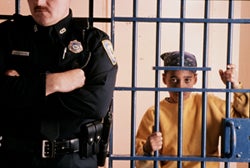At a February 12 event, Harvard Law School faculty members joined juvenile court judges and experts in child development to discuss how neuroscience can be better used in the courtroom to break the cycle of child maltreatment.
Professors Elizabeth Bartholet ’65, Martha Minow, and Charles Ogletree ’78 discussed how the legal system fails to meet the needs of children struggling with abusive or neglectful parents.
“Policy makers generally know better than they do,” said Bartholet, director of the Child Advocacy Program at HLS. “Neglected children die at the same rate that abused children do. Social science shows us that intervening relatively early…and removing larger numbers of these kids to place them in adoption works. If we really had ‘best interest of the child’ in mind, we would be doing that.”
Ogletree, executive director of the Charles Hamilton Houston Institute, said the adversarial nature of the legal system is not ideal for solving child neglect cases. In the courtroom, the judge and the attorneys try to determine who is to blame, instead of determining how to meet the best interests of the child, he said.
“The legal system is a system of crisis intervention,” Ogletree said. “We come in much too late. We come in at a time that is very critical and never have all the resources.”
An expert in human rights and primary education, Minow advocated for more intervention programs in the schools. Screening programs, teacher education programs, and a focus on creating more awareness of the signs of child neglect would give authorities more opportunities to remove children from problematic situations, she said. Minow added that school is a particularly useful place for intervention since all children have to go to school.
Charles Nelson, a professor who specializes in pediatric development at Harvard Medical School, outlined neuroscience research he has conducted on abused children in Romania. He showed brain scans of children who are under stress and suffering from depression compared to brain scans of children who have better home environments. The scans clearly demonstrated that the earlier a child is removed from a neglectful or abusive situation, the better the chances of the child recovering full brain activity.
Several juvenile court justices from Boston and elsewhere were on hand to comment on how they make decisions in the courtroom, including Cindy Lederman, presiding judge of the Miami-Dade County Juvenile Court.
The event was sponsored by the Center on the Developing Child, a new program devoted to creating more interdisciplinary dialog on how to improve the lives of children.
